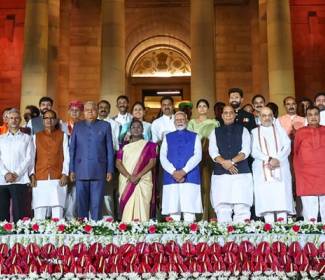India's Agro Food Cluster, which includes the sectors of agriculture, food processing, animal husbandry, dairying and fisheries, has been a key driver of the country's economic growth. In the recently announced interim budget, special focus has been laid on the cluster and some highlights, achievements and initiatives have been discussed herewith.
According to the provisional data from DGCI&S, the exports of agricultural and processed food products increased by 13% in the first nine months of the current fiscal year (April-December) compared to the same period of the previous year. The total export value reached $19.7 Bn, which is 84% of the target set by APEDA for the year 2022-23. APEDA, under the Ministry of Commerce and Industry, promotes and regulates the export of these products. Some of the products that showed significant growth in exports were processed fruits and vegetables (30.36%), fresh fruits and vegetables (4%), and cereals preparation & miscellaneous processed items (24.35%). The seafood sector also achieved a record export volume and value of 17,35,286 MT and $8.09 Bn respectively, despite facing challenges such as the Covid-19 pandemic, logistics issues and climate change. India is one of the leading exporters of seafood in the world, with a market share of about 7%. The past year’s growth story is expected to continue with the announcement of new reforms and highlights with the Interim Budget 2024-25.
Youth and Entrepreneurship
PM Mudra Yojana has sanctioned 43 Cr loans aggregating to INR 22.5 lakh Cr for the entrepreneurial aspirations of our youth. Additionally, Fund of Funds, Start-Up India, and Start-Up Credit Guarantee schemes have been assisting the youth. To stimulate private sector research and innovation in sunrise sectors, a corpus of INR 1 lakh Cr shall be established with a fifty-year interest-free loan.
SHGs
It has been proposed, during the interim budget, to raise the goal for Lakhpati Didi from 2 Cr to 3 Cr in light of Lakhpati's success.
Taxes
The threshold for presumptive taxation for retail businesses was increased from INR 2 Cr to INR 3 Cr. Additionally, the corporate tax rate was decreased from 30% to 22% for existing domestic companies and to 15% for certain new manufacturing companies.
Agriculture
Farmer Centric-Initiatives
Through PM-KISAN SAMMAN, a farmer-centric Yojana, 11.8 Cr farmers, including marginal and small farmers, received direct financial assistance. Under the PM Fasal Bima Yojana, 4 Cr farmers received crop insurance in the FY 2023-24. The Electronic National Agriculture Market is providing services to 1.8 Cr farmers facilitating a trading volume of around 3 lakh Cr and has 1361 integrated mandis. The application of Nano DAP on a variety of crops shall be increased to all agroclimatic zones following the successful adoption of Nano Urea. A new program for bio-manufacturing and bio-foundry shall be introduced to encourage green growth. This shall enable the availability of environmentally friendly substitutes, including biodegradable polymers, bioplastics, biopharmaceuticals, and bioagri inputs. This shall be an enabler to the shift from the current paradigm of consumptive production to one based on regenerative principles.
Employment
Under the Pradhan Mantri Kisan Sampada Yojana, 38 lakh farmers have benefited from the Sampada Yojana, which has also created 10 lakh jobs.
Research & Development
To attain "atmanirbharta" for oil seeds like mustard, peanut, sesame, soybean, and sunflower, a plan shall be developed. This shall encompass research on high-yielding cultivars, broad use of contemporary agricultural methods, connections to markets, acquisition, value-adding, and crop insurance etc.
Food Processing
The food processing sector has been central to the growth in the agro-food processing cluster. The Formalisation of Micro Food Processing Enterprises under Pradhan Mantri Yojana has helped sixty thousand people and 2.4 lakh SHGs establish credit connections. To ensure exponential industry growth, the promotion of public and private investment in post-harvest activities such as aggregation, contemporary storage, effective supply chains, primary and secondary processing, marketing, and branding has been planned.
Dairy
A thorough plan to assist dairy farmers shall also be developed, building on the achievements of other programs, including the National Livestock Mission, the Rashtriya Gokul Mission, and the Infrastructure Development Funds for animal husbandry and dairy processing that have observed resounding success. It was also highlighted that control measures for foot and mouth disease are already in place.
Fisheries
After the establishment of a distinct Department of Fisheries in 2019, the production of seafood and exports, both in inland and aquaculture the Minister announced Blue Economy 2.0, an integrated and multi-sectoral approach to coastal aquaculture and mariculture, as well as a strategy for restoration and adaptation measures, that shall be introduced to promote climate resilient activities for the blue economy 2.0. The Pradhan Mantri Matsya Sampada Yojana (PMMSY) will be implemented more aggressively to boost aquaculture production from the current 3 to 5 tonnes per hectare; treble exports to about 1 lakh Cr; and create 55 lakh job opportunities soon. Additionally, five integrated aquaparks shall also be built under the Yojana.
Although the announcements have been a part of the Interim Budget, they continue to remain critical in the economic growth of the cluster and India at large.




